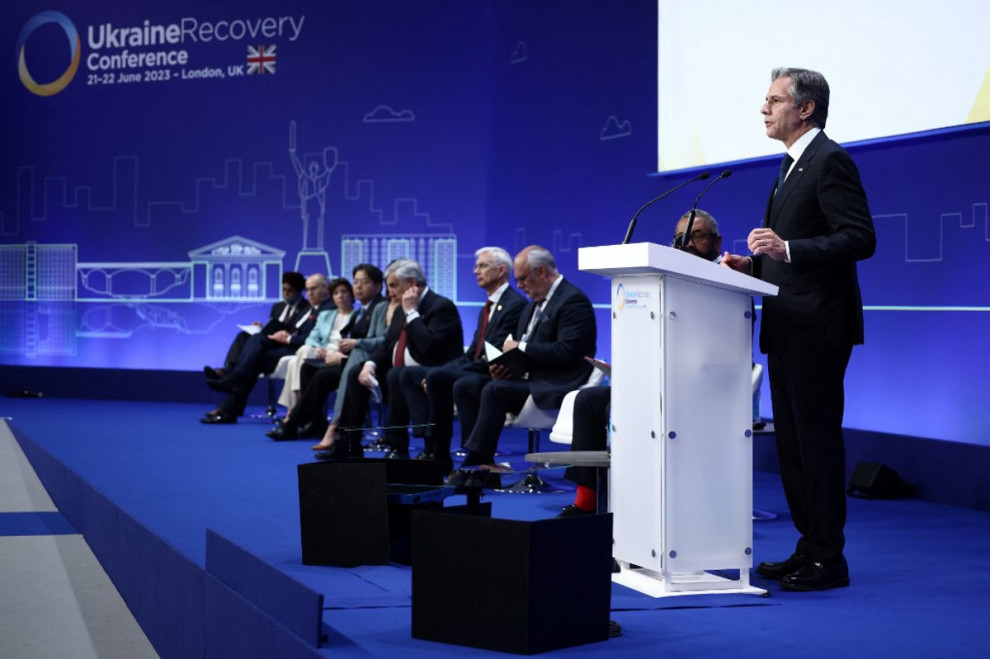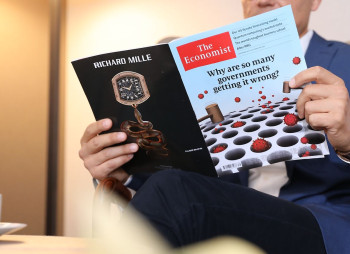More than 400 global companies pledged support Wednesday for rebuilding the war-torn economy at the Ukraine Recovery Conference in London. Citi, Sanofi (SNY) and Philips are among firms that have signed up to the Ukraine Business Compact, signaling their intent to boost investment in the country.
The UK government has also set out a package of support for Ukraine, including $3 billion of new guarantees to unlock World Bank loans and £240 million ($305 million) of bilateral assistance.
US Secretary of State Antony Blinken said at the conference that the United States would send an additional $1.3 billion in financial assistance to Ukraine to “overhaul its energy grid” and modernize other critical infrastructure.
Ukraine faces an enormous fundraising challenge, and it’s one that governments and development finance institutions won’t be able to meet without help from private investors. The World Bank estimated in March that the cost of rebuilding the country one year on from the start of the war amounted to $411 billion — a huge figure that is set to increase as the conflict drags on.
To help meet that need, Ukrainian President Volodymyr Zelensky has enlisted BlackRock (BLK) and JPMorgan to advise on the Ukraine Development Fund, a vehicle that seeks to mobilize capital from private and public sector investors toward rebuilding the Ukrainian economy.
Private investors see a “tremendous opportunity” to invest in Ukraine’s post-war future, according to Stefan Weiler, JPMorgan’s head of debt capital markets for central and eastern Europe, the Middle East and Africa.
Weiler, who traveled to Kyiv in February, told CNN he was impressed by how “forward-looking” the government is in preparing for the post-war period.
The Ukraine Development Fund is still in the planning stages and is not expected to launch until the conflict ends. But it faces a crucial test Wednesday, when it will canvas support from governments and investors attending the London conference.
It’s an opportunity to “socialize” the idea of the fund and its mission, which is to “attract as much private sector capital into the reconstruction of Ukraine as possible,” said Brandon Hall, co-head of BlackRock’s Financial Markets Advisory arm.
Attracting private investment
The Ukraine Development Fund aims to raise so-called concessionary capital from governments and development banks, and then use that to attract private investment. Concessionary capital is provided on more favorable terms and can include debt issued at below-market interest rates or equity from investors asking for lower returns.
“The idea here is you can scale that initial concessionary capital by some orders of magnitude and thereby increase the firepower of the fund to invest across various sectors of the economy,” Hall told.
The Ukrainian government has identified five industries to which initial investments from the fund will be directed: infrastructure, energy, manufacturing, agriculture and information technology.
“We will be able to offer interesting projects to invest in… We want global partners to come who can provide us with large investments,” Zelensky said in a statement about the fund last month.
Speaking in London Wednesday, he added: “At this conference, we must move from vision to agreements, and from agreements to real projects.”
UK Prime Minister Rishi Sunak also unveiled a “war-risk insurance” framework, backed by Group of Seven countries, which will help limit potential losses faced by private investors in Ukraine.
“This is a huge step forward towards helping insurers to underwrite investments into Ukraine, removing one of the biggest barriers and giving investors the confidence they need to act,” Sunak said in a speech at the conference.
Private and public sector investors are already deploying capital in the country, even though the end of the war may yet be some way off.
Horizon Capital, a US private equity firm, has won backing from a dozen major development finance institutions for its funds investing in Ukrainian tech and export-oriented companies.
Horizon’s $254 million Growth Fund, which closed to initial contributions in April, was at the time the largest Ukraine-focused fund set up since Russia launched a full-scale invasion of its neighbor, according to the firm’s CEO Lenna Koszarny.
On Tuesday, the European Union’s executive arm put forward a proposal for a support package of up to €50 billion ($55 billion) for Ukraine.
The facility would be financed with grants from the EU budget, loans raised on capital markets and proceeds from frozen Russian assets, European Commission President Ursula von der Leyen said Wednesday.
The EU estimated in April that about $300 billion of assets belonging to Russia’s central bank were frozen in G7 countries. Von der Leyen said the Commission would make a proposal on tapping these assets before the end of the summer.
The United Nations, meanwhile, plans to mobilize $300 million for a Community Recovery Fund to restore housing and critical infrastructure, and support local businesses in Ukraine.






